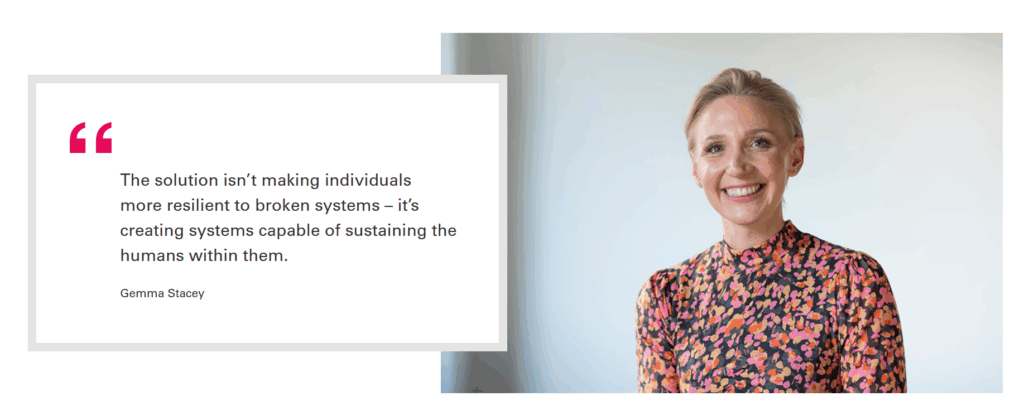Professor Gemma Stacey, Associate Dean of Practice in the School of Social Sciences, explores whether current approaches to resilience in healthcare are addressing the wrong problem.
By Professor Gemma Stacey

Picture this: a newly qualified nurse sits in yet another mandatory resilience training session. The message is clear: develop better coping strategies, build resilience. At the same time, this nurse is working 12-hour shifts on an understaffed ward, navigating complex hierarchies where speaking up feels risky, and constantly managing the gap between the compassionate care they want to deliver and what the system actually allows. But apparently, the problem is a lack of resilience.
This scenario plays out across healthcare systems worldwide. The prevailing narrative is remarkably consistent: students and early career nurses lack the resilience needed for the demands of modern healthcare. Younger generations cannot cope with the pressures. Current training is too academic and doesn’t equip professionals for the “real world”. Poor resilience, we’re told, drives the international nursing workforce crisis.
But what if we’ve been asking entirely the wrong questions?
The rules of a game nobody explains
Research I conducted between 2010 and 2016 revealed a completely different scenario. Early career professionals weren’t lacking resilience; they were navigating extraordinarily sophisticated identity work within complex organisational contexts. They had to appear confident enough to seem competent, but not so confident as to appear arrogant. They needed to publicly engage in fundamental care whilst privately strategising about accessing the learning opportunities required to demonstrate competence. They had to be critical thinkers, but not so critical that they appeared challenging.
These weren’t deficit behaviours. They were survival strategies for an elaborate game with unwritten rules.
This led to my first “what if” question: What if we designed an educational forum that explicitly acknowledged this complexity and gave early career professionals permission to reflect on and gain support for navigating it?

From evidence to action
The answer became Resilience-Based Clinical Supervision, co-produced with students, early career healthcare professionals, clinical supervision experts and compassion-focused therapists. Our case study research demonstrated how this structured, group-based reflective discussion influenced care towards both self and others among student nurses.
Between January 2020 and August 2025, over 1,700 people completed champion programmes through partnerships with the Foundation of Nursing Studies, spreading across the UK and internationally to Australia, Canada, and parts of Africa. What changed when organisations implemented it? Workplace rituals shifted. Teams incorporated mindfulness. Professionals felt able to share challenges with managers rather than hiding struggles.
The evaluation revealed something important: there was never a deficit of resilience in individuals. There was a deficit of enabling organisational cultures. Moreover, individual interventions, however effective, cannot transform entire systems without addressing organisational and cultural factors.
The leadership paradox
This prompted another question: If leadership is the dominant influence on organisational culture, what if we deliberately designed leadership programmes to develop the capabilities needed to create compassionate and safe cultures of care?
As Deputy Chief Executive of the Florence Nightingale Foundation, I had the opportunity to test this theory. We transformed the organisation from supporting 337 professionals in 2019/20 to creating a networked community of 250,000 nurses and midwives worldwide by 2022/23. Through rigorous realist evaluation, we identified core confidence as the central mechanism driving transformational leadership development. Developing this required significant personal reflection to understand and unpick the professional armour leaders had developed to survive the demands of the system.
We’d come full circle. The “lack of resilience” was actually a rational response to systems that undermined confidence rather than building it.
When the solution becomes the problem
We frequently heard that leaders were navigating structures designed to ensure safety, but which actually constrained the very things (trust, autonomous practice, genuine improvement) that create resilient organisations.
My recent integrative review supports this regulatory paradox. The more organisations try to control through preventative measures and oversight, the less they enable the trust and autonomous practice that resilient systems require. Staff become focused on compliance rather than care, on protecting themselves from blame rather than innovating solutions.
Before we rush to add more rules, more training requirements, more mandatory interventions, we should pause to ask: whose needs are really being met? Are we creating systems that enable the kind of healthcare we want, or systems that meet our own need to feel we’re doing something?
Thinking again about what we think we know
Twenty-first century healthcare operates in what business scholars call a VUCA world: Volatility, Uncertainty, Complexity and Ambiguity. Yet our response often reaches for simple solutions: more resilience training, stricter oversight, clearer protocols.
My research points toward the same conclusion: lasting change requires addressing structural barriers rather than individual deficits.
The nursing workforce crisis is real. The pressures are immense. But the solution isn’t making individuals more resilient to broken systems. It’s creating systems capable of sustaining the humans within them.
*This blog is based on Professor Stacey’s Inaugural Lecture “Reframing and reclaiming resilience for a sustainable healthcare system”, delivered at NTU in Nottingham in November 2025.
